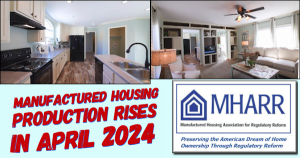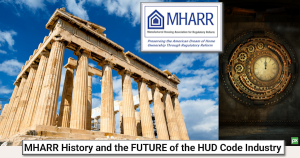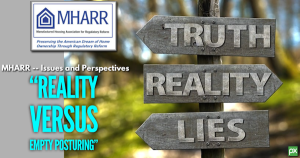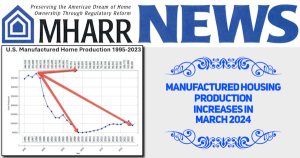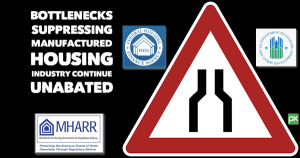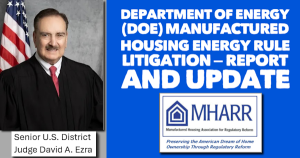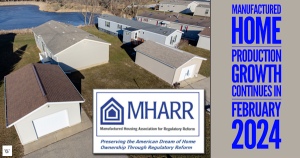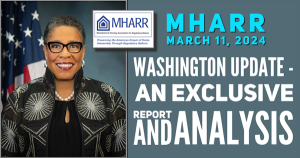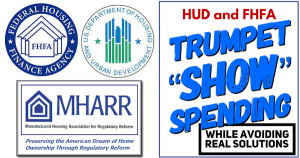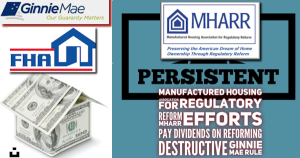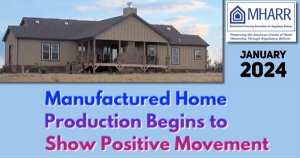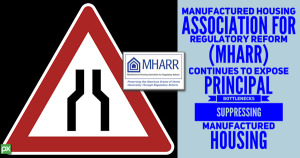MHARR History and the FUTURE Of The HUD Code Industry
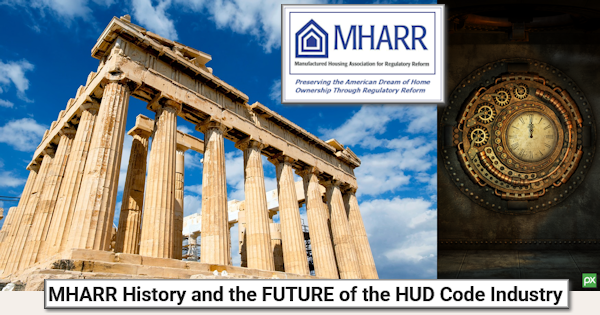
MAY 20, 2024
TO: HUD CODE MANUFACTURED HOUSING INDUSTRY MEMBERS
FROM: MHARR
RE: MHARR HISTORY AND THE FUTURE OF THE HUD CODE INDUSTRY
The attached materials – a brief history of the Manufactured Housing Association for Regulatory Reform (MHARR) and a summary of its accomplishments on behalf of the manufactured housing industry – are self-explanatory. They illustrate, in a concise format, the role that MHARR has fulfilled, for nearly 40 years, on behalf of HUD Code manufacturers and the manufactured housing industry at large.
This brief history, and the victories that MHARR has been able to achieve for the benefit of both the industry and American consumers of affordable housing, are particularly significant and relevant now, as the industry stands poised at a crucial cross-roads that will ultimately determine its long-term future and continued viability as the nation’s premiere resource for inherently affordable home ownership.
Put simply, the industry today is building its best, most affordable, and most energy-efficient homes ever. But even with the United States mired in an affordable housing crisis, which has seen housing costs rise to unprecedented levels, the annual production of manufactured homes since 2009 has averaged fewer than 78,000 homes per year and, over that same period, has only rarely exceeded the 100,000 home historical benchmark. In large measure, this is due to the fact that the industry’s post-production sector representation has failed to aggressively demand the full enforcement and implementation of the enhanced federal preemption of the Manufactured Housing Improvement Act of 2000 in order to invalidate exclusionary zoning mandates and the Duty to Serve (DTS) directive of the Housing and Economic Recovery Act of 2008 (HERA) in order to compel the non-discriminatory treatment of manufactured housing personal property loans by Fannie Mae, Freddie Mac and the Federal Housing Finance Agency (FHFA) – the two primary bottlenecks that have suppressed industry production and sales. Simply stated, the industry cannot effectively market its mainstream affordable homes if those homes are excluded by discriminatory zoning and/or cannot be financed at reasonable and competitive interest rates.
This failure cannot and must not continue. Things can and must change in the nation’s capital. As noted above (and on many previous occasions) there are specific laws put in place jointly by MHARR and the Manufactured Housing Institute (MHI) that were designed to address and resolve these issues, but these laws have remained ignored by the relevant authorities for far too long without concerted and highly-targeted industry push-back. The current disarray of the industry’s post-production sector in Washington, D.C. must be remedied so the industry can achieve a crucial reset at the national level and revive its preeminent role in the affordable housing market – a change that can only be achieved with mainstream, affordable manufactured homes.
https://manufacturedhousingassociationregulatoryreform.org/brief-history-and-objectives-of-the-manufactured-housing-association-for-regulatory-reform-mharr/
https://manufacturedhousingassociationregulatoryreform.org/major-and-continuing-mharr-accomplishments-for-the-hud-code-manufactured-housing-industry-and-consumers-of-affordable-housing/

Manufactured Housing Association for Regulatory Reform (MHARR)
1331 Pennsylvania Ave N.W., Suite 512
Washington D.C. 20004
Phone: 202/783-4087
Fax: 202/783-4075
Email: MHARRDG@AOL.COM
Website: www.manufacturedhousingassociation.org
MAY 20, 2024
TO: HUD CODE MANUFACTURED HOUSING INDUSTRY MEMBERS
FROM: MHARR
RE: MHARR HISTORY AND THE FUTURE OF THE HUD CODE INDUSTRY
The attached materials – a brief history of the Manufactured Housing Association for Regulatory Reform (MHARR) and a summary of its accomplishments on behalf of the manufactured housing industry – are self-explanatory. They illustrate, in a concise format, the role that MHARR has fulfilled, for nearly 40 years, on behalf of HUD Code manufacturers and the manufactured housing industry at large.
This brief history, and the victories that MHARR has been able to achieve for the benefit of both the industry and American consumers of affordable housing, are particularly significant and relevant now, as the industry stands poised at a crucial cross-roads that will ultimately determine its long-term future and continued viability as the nation’s premiere resource for inherently affordable home ownership.
Put simply, the industry today is building its best, most affordable, and most energy-efficient homes ever. But even with the United States mired in an affordable housing crisis, which has seen housing costs rise to unprecedented levels, the annual production of manufactured homes since 2009 has averaged fewer than 78,000 homes per year and, over that same period, has only rarely exceeded the 100,000 home historical benchmark. In large measure, this is due to the fact that the industry’s post-production sector representation has failed to aggressively demand the full enforcement and implementation of the enhanced federal preemption of the Manufactured Housing Improvement Act of 2000 in order to invalidate exclusionary zoning mandates and the Duty to Serve (DTS) directive of the Housing and Economic Recovery Act of 2008 (HERA) in order to compel the non-discriminatory treatment of manufactured housing personal property loans by Fannie Mae, Freddie Mac and the Federal Housing Finance Agency (FHFA) – the two primary bottlenecks that have suppressed industry production and sales. Simply stated, the industry cannot effectively market its mainstream affordable homes if those homes are excluded by discriminatory zoning and/or cannot be financed at reasonable and competitive interest rates.
This failure cannot and must not continue. Things can and must change in the nation’s capital. As noted above (and on many previous occasions) there are specific laws put in place jointly by MHARR and the Manufactured Housing Institute (MHI) that were designed to address and resolve these issues, but these laws have remained ignored by the relevant authorities for far too long without concerted and highly-targeted industry push-back. The current disarray of the industry’s post-production sector in Washington, D.C. must be remedied so the industry can achieve a crucial reset at the national level and revive its preeminent role in the affordable housing market – a change that can only be achieved with mainstream, affordable manufactured homes.
https://manufacturedhousingassociationregulatoryreform.org/brief-history-and-objectives-of-the-manufactured-housing-association-for-regulatory-reform-mharr/
https://manufacturedhousingassociationregulatoryreform.org/major-and-continuing-mharr-accomplishments-for-the-hud-code-manufactured-housing-industry-and-consumers-of-affordable-housing/

Manufactured Housing Association for Regulatory Reform (MHARR)
1331 Pennsylvania Ave N.W., Suite 512
Washington D.C. 20004
Phone: 202/783-4087
Fax: 202/783-4075
Email: MHARRDG@AOL.COM
Website: www.manufacturedhousingassociation.org

